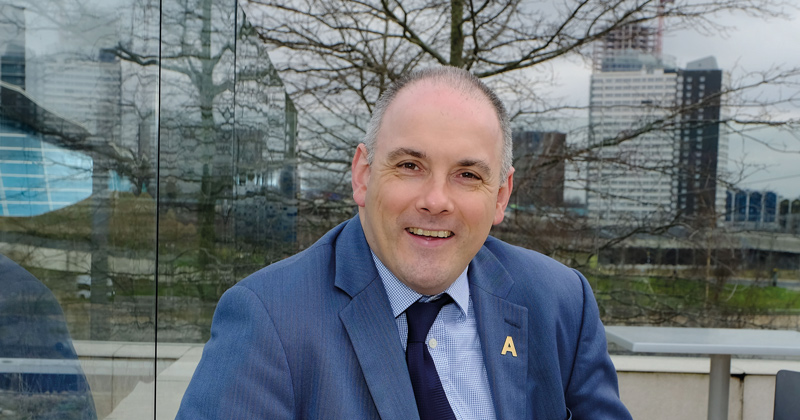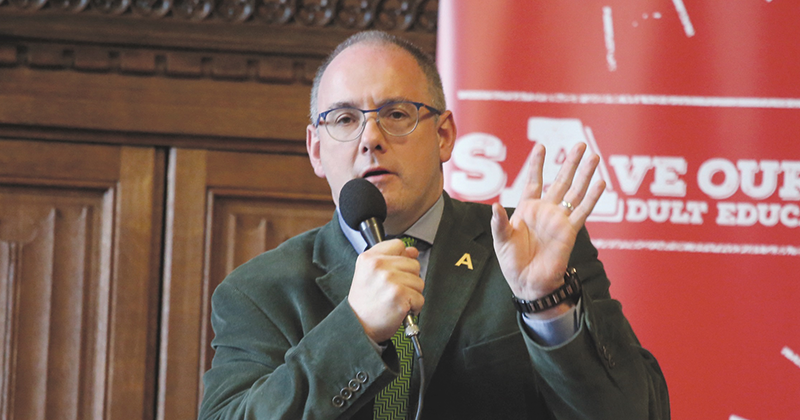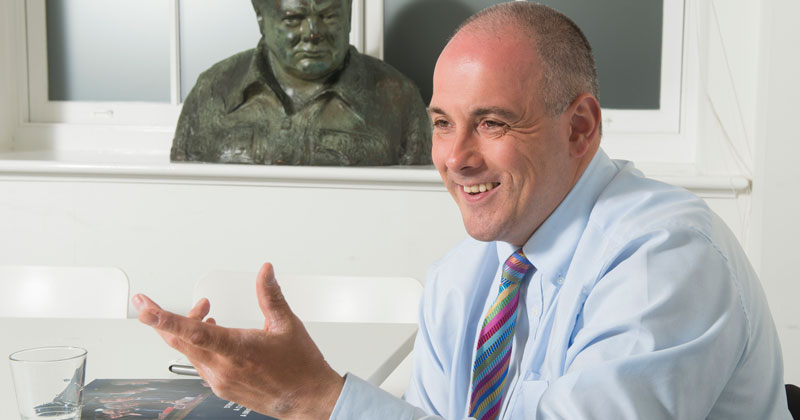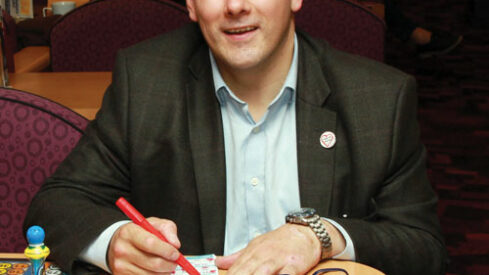Robert Halfon, the new chair of the education select committee, campaigned in the corridors of Parliament for the position using leaflets and badges as if he were in a school election for class representative.
Having lost his position as skills minister just weeks before, he wasn’t going to let this chance go. The badges and leaflets, and almost every sentence from his lips, all included the phrase “the ladder of opportunity”, a saying he repeated interminably as a minister.
Titters went up around the lobby among politicians too posh to poll for their positions.
“It’ll never work,” a senior Whitehall official told me at the time. He was wrong; Halfon won the vote.
“Everyone was talking about it,” he says, as we sit in his comfy ground floor office, tucked away between a lift and a carpark, and furnished with an armchair allegedly once owned by Winston Churchill.
He says he neither cared for nor noticed the funny looks. But then, this isn’t a new move for Halfon, who had to stand three times for his parliamentary seat (losing by just 87 votes the second time) before he finally won.
In the world as it is, no one has time to hear anything unless you repeat it 10 million times
During election times in his constituency of Harlow – classic Essex white-van man territory – he stands for up to six hours each day at the side of the A414 with a sign of his name, holding his thumbs up to commuters. At first they toot horns and shout expletives. But by the time polling day rolls around they are shouting “hi Rob” and head off to vote for the one candidate they’ve seen every day for weeks.
“People look at you bemused when you do these things,” he admits, “but I kept repeating the ‘ladder of opportunity’ all the time. In the world as it is, no one has time to hear anything unless you repeat it 10 million times. Why do you think you get a pizza delivery leaflet every day or every week? Because even though you might not look at it for six months, there’s going to be a rainy day when you don’t want to cook and you’re going to look for the leaflet in your drawer and order the pizza. So, slowly, you have to repeat the message, again and again and again.”
The ladder is more than a metaphor. I can attest to this as I’ve seen it on leaflets, heard about it in speeches, in emails and in emailed speeches.
Ultimately, the ladder looks at each phase of the education sector – early years through to adult learning – and analyses how opportunities can be spread around and what interventions must happen to ensure everyone gets onto it.

Halfon is a long-time evangelist for apprenticeships, having first encountered them via the charity Catch 22, where he spoke with young people who said that if they’d had easier access to apprenticeships they might not have ended up involved in crime.
He strongly believes pupils should be able to move easily between technical qualifications, apprenticeships and degrees and, if pushed, he believes more grammar schools would be okay as long as they are accompanied with equally selective technical schools, as was first envisaged by the Conservatives back in the 1940s.
“I’m a passionate supporter of university technical colleges [vocational schools recruiting from 14]. I know they have a mixed record but it transforms the idea of the way we see technical education,” he says. “I’d love to see more UTCs but in a different way, possibly with a different age group, possibly starting at 16, and really with high rigour.
You have to put all the financial incentives towards addressing the skills deficit
He’s this keen on technical education because he’s seen the future, and it’s not hospitable for people without the right skills.
“There was a newspaper article last week saying the Chinese had invented a robot that could read better than humans. Five Guys [a burger chain] in New York is now being served by robots. We’ve got a Five Guys in Harlow,” he trails off, and waves his hand.
“There was another report in the paper that the gender imbalance between men and women is going to get worse because of the robots. So we must grapple with this. Every part of our education should have a technical link. I did history, English and politics for A-level. That shouldn’t have been allowed; I should have had to do a maths and science. I don’t mean having to do additional maths, but even a basic maths. I should have had to do something.
“Same with university, what did I go and do? Politics. I should have had to do some kind of science or technical subject all the way through. You have to put all the financial incentives towards addressing the skills deficit. If someone wants to do medieval history, that’s wonderful! But they should take an additional loan and pay back an amount, and get no incentives for it.”

Halfon, however, didn’t go down a technical education route. He was raised in a traditional Jewish family and studied at Highgate, an independent school in north London, after his parents, who fled Libya in the early days of the Gadhafi regime, developed a successful fruit and vegetable wholesalers. After school he studied politics at Exeter University and went on to study a masters in international relations.
So if he didn’t follow an apprenticeship route, why does he think it’s right for others?
“I’d have loved to do an apprenticeship if I’d been able to, either in law or journalism. That’s why I introduced the parliamentary apprenticeship scheme. I would have loved to have done that.
“But if you’re from an immigrant family and you’re self-made, you just want your kids to go to university. I get that. But that’s why I go on about this. At a dinner, if somebody said they went to Oxbridge, I want someone to say ‘that’s nice’, then if someone’s done an apprenticeship, everyone goes ‘wow, what’s it in? How did you get it? What’s the job at the end?’”
Putting his money where his mouth is, he was the first MP to have an apprentice and it’s no coincidence that every time I’ve met this apprentice, she has discussed her job title with real pride.
Team Halfon is always on brand.
Education committee chairs vary in their tenacity. Graham Stuart, who chaired the committee when Michael Gove was education secretary, often threw shade on Gove’s policies and claimed it was the committee who stymied the secretary of state’s more aggressive plans for GCSE reform. Neil Carmichael, Halfon’s predecessor, was easier on the government but much harsher on Ofsted.
I do like Amanda Spielman, I have to say. I’ve been impressed with her committee
Halfon admits the power of the role is enormous because it doesn’t depend on goodwill from the government.
“Because you’re elected by all the MPs you’re not dependent on patronage by the government. It means the committee can have an incredible role in terms of being investigative. I’m not dependent on anything except for a general election where I lose the post automatically, and that is incredibly important.”
He feels better about Ofsted, however: “I do like Amanda Spielman, I have to say. I’ve been impressed with her committee. But they’ve got to be much, much better at judging schools in terms of career advice, which is appalling.”
Mostly, however, he wants the committee to be a “powerhouse of ideas” and bring solutions to the table. In particular, he is interested in exclusions and the 50,000 young people taught in alternative schools.
“It’s a major social injustice: 35 children are being excluded every day, 60 per cent of prisoners have been excluded. In my own constituency a really good single parent saw their child excluded from school. He was cyberbullied for months and went and had a fight with the kid. The child who had the fight was then excluded. The appeal panel was a fake. The parents have no rights and when the appeal panel said the child should come back, the headmaster disagreed and overturned it. So what’s the point in having the panel?

“The quality of alternative provision is very patchy in certain areas of the country. It’s absolutely criminal. We are ignoring the education of thousands of children. I’m not saying there should not be any exclusions. You have to if people bring drugs to schools, this kind of thing. I’m not against all exclusions.
“Nonetheless, why do some schools virtually manage to exclude no one,” he asks.
“I think a significant amount of government attention needs to be focused on talking about social injustice. I hate all the social mobility talk. Social mobility is just about people who are mobile. Social injustice is about bringing people to the ladder of opportunity who are never going to get there unless you have active intervention from the government to change the system and make it work properly. We should get back to using the term ‘social justice’ properly.”
I believe in tradition, because it provides an anchor from one generation to the next
His demands – more focus on skills and social justice – sound almost socialist. What exactly is it that led him to become a Conservative? He returns to his stock answer, that he found Margaret Thatcher inspirational, but he admits it’s more than that. He doesn’t like the idea of central control; he just wants to help people to get to the ladder, and then it’s up to them if the climb it.
“Also I believe in tradition, because it provides an anchor from one generation to the next, and because, to use a dreaded word, you have stability.
“All the crazy stuff that goes on here, for example. The fact I can’t get up in the chamber and say ‘you said this’; I have to say ‘the right honourable lady’. I used to think it was ridiculous, but if you imagine it’s like an apple, and every time you take a bite out of the apple, you get to the core, then the whole thing deteriorates and bacteria gets in and so on and so on.
“Hitler was only able to do what he was able to do what he did because the German parliamentary democracy had got so weak in the past 15 years, they’d whittled away one thing after another. So I think all the crazy traditions that are in the House of Commons, while they sometimes really frustrate me, they’re there for a purpose, which is to protect the core of our democracy.”

Another of his trademarks are his funky ties. One which he commonly wears at committee hearings looks exactly like the cover of the national curriculum documents from 2007. So how does he feel about the Commons no longer requiring ties?
I’ve gone in a couple of times not wearing a tie, either because I forgot or someone spilt Diet Coke all over my tie
“I’ve gone in a couple of times not wearing a tie, either because I forgot or someone spilt Diet Coke all over my tie. On the whole, I do wear it, because it’s such a special place. I was watching Narcos, the Netflix series about Pablo Escobar, one of the biggest Latin-American drug kings, and there’s a wonderful part where he gets elected and they make him put a tie on. This drug lord who controlled half of Colombia and killed people, but he was forced to wear a tie in the Colombian parliament. Amazing!”
Time is up for the interview, although one gets the sense with Halfon that his message will continue following you out the door. Indeed, as I go to leave, he insists his chief of staff gets me a copy of his ladder of opportunity.
“I already have a copy, lots of copies,” I say.
“This one is new,” he replies. “Look on the wall, we’ve added new statistics.” Sure enough, in red lettering, there are some new lines on the ladder.
Of course, I left with the leaflet. And here I am talking about his persistence. Brand Halfon wins again.
It’s a personal thing
Favourite book?
Non-fiction, the best book I ever read, was about a Nazi called Albert Speer by Gitta Sereny, who interviewed him over 20 years. When I read that book, I couldn’t breathe. I swear I’m not exaggerating. You think it’s going to be so heavy-going, but it’s incredible, because it tells you how people fall into evil. There’s no book like it on the planet.
For fiction, I love The Mayor of Casterbridge because it points out our human flaws, and Crime And Punishment for the same reason.
What do you eat for breakfast?
Varies. It’s called the ACC diet, which is often Anadin, Diet Coke and a cigar. But sometimes I have poached eggs.
Which animal are you most like?
Lion: Courageous and reflective. I love lions.
If you were invisible for a day what would you do?
Give me more time and I’ll get back to you.
Best recent purchase for under £30
A watch winder I bought on Amazon. I collect watches. This one is a Seiko but it’s automatic so it relies on the movement of the hand. When you’re not wearing it, you put it on the watch winder, it’s lovely because it goes round and round, just enough to keep the battery alive.














Hooray for Halfon and his commitment to skills. But he’ll have to watch schools minister Nick Gibb who hates the word.
That said, increasing the emphasis on technical subjects and skills won’t be done by reintroducing a tri-partite system of secondary education. All pupils need access to these skills and subjects. This would be best addressed by a national roll-out of an updated Technical and Vocation Educational Initiative (TVEI) – Lord Baker’s baby and more effective that UTCs/studio schools which can only ever educate a tiny number of English teenagers.